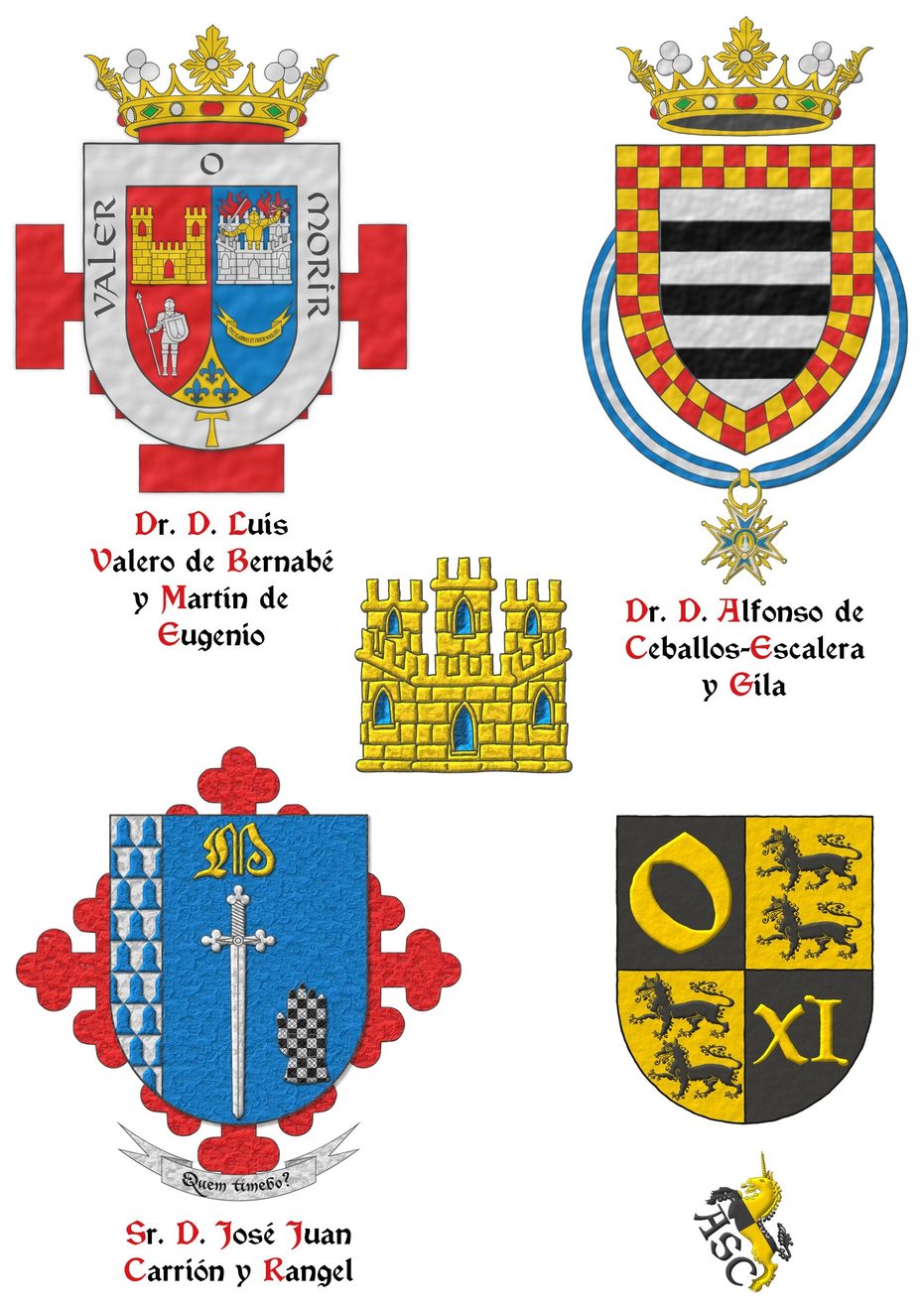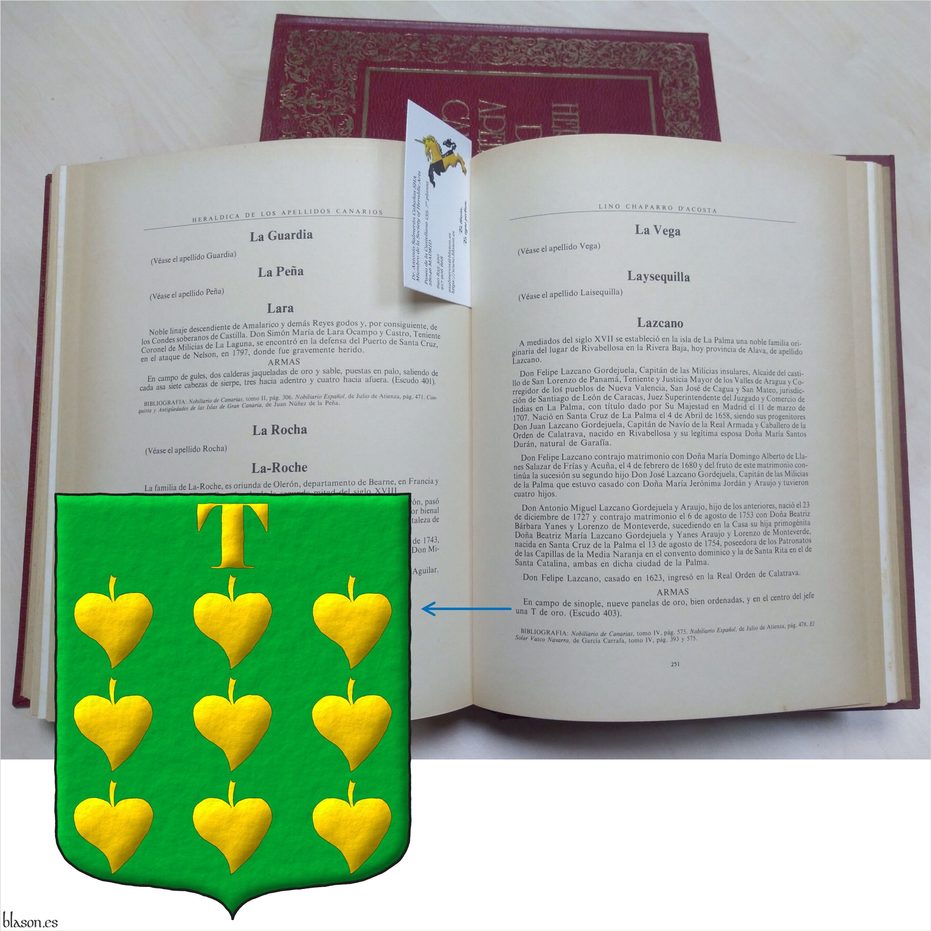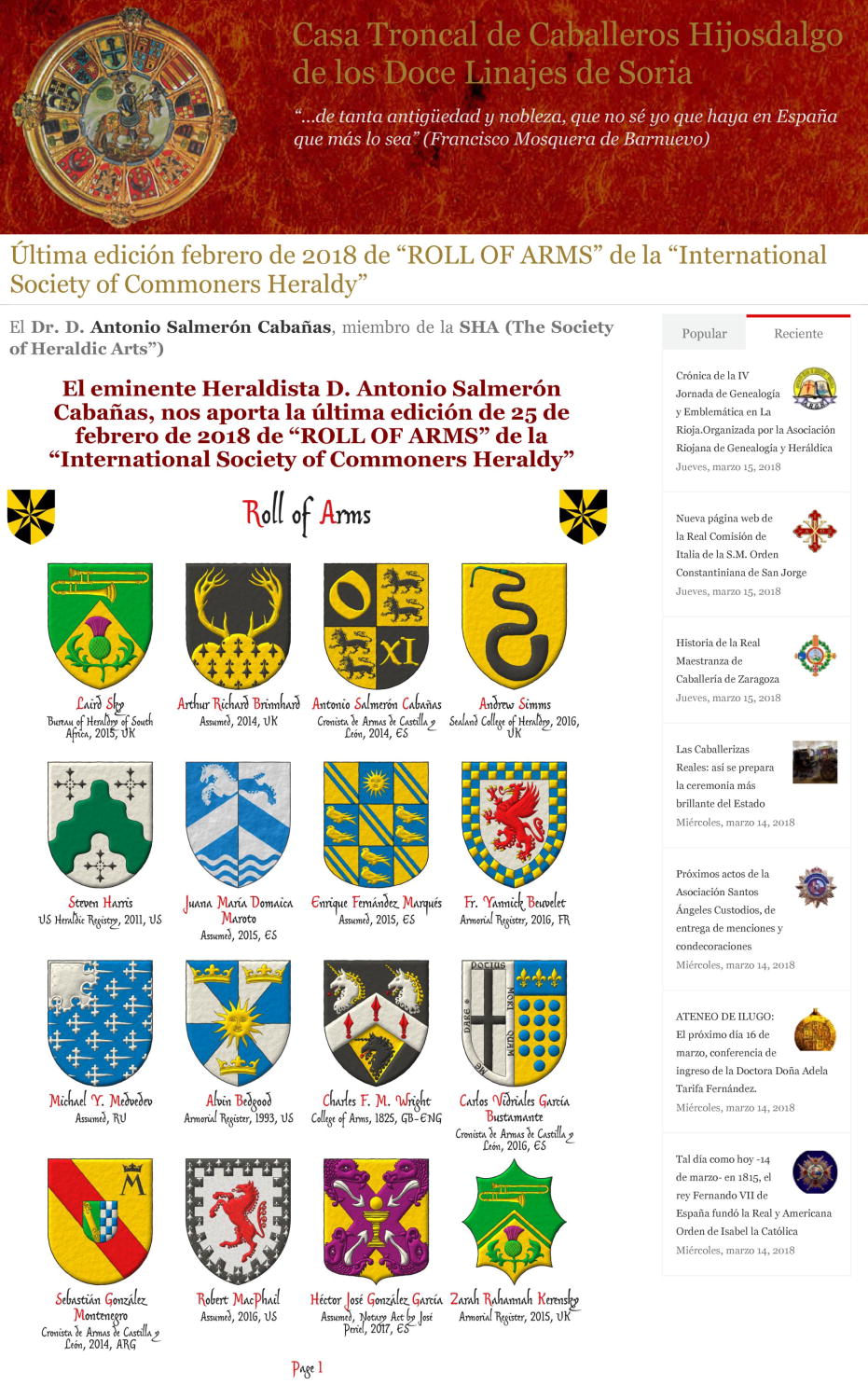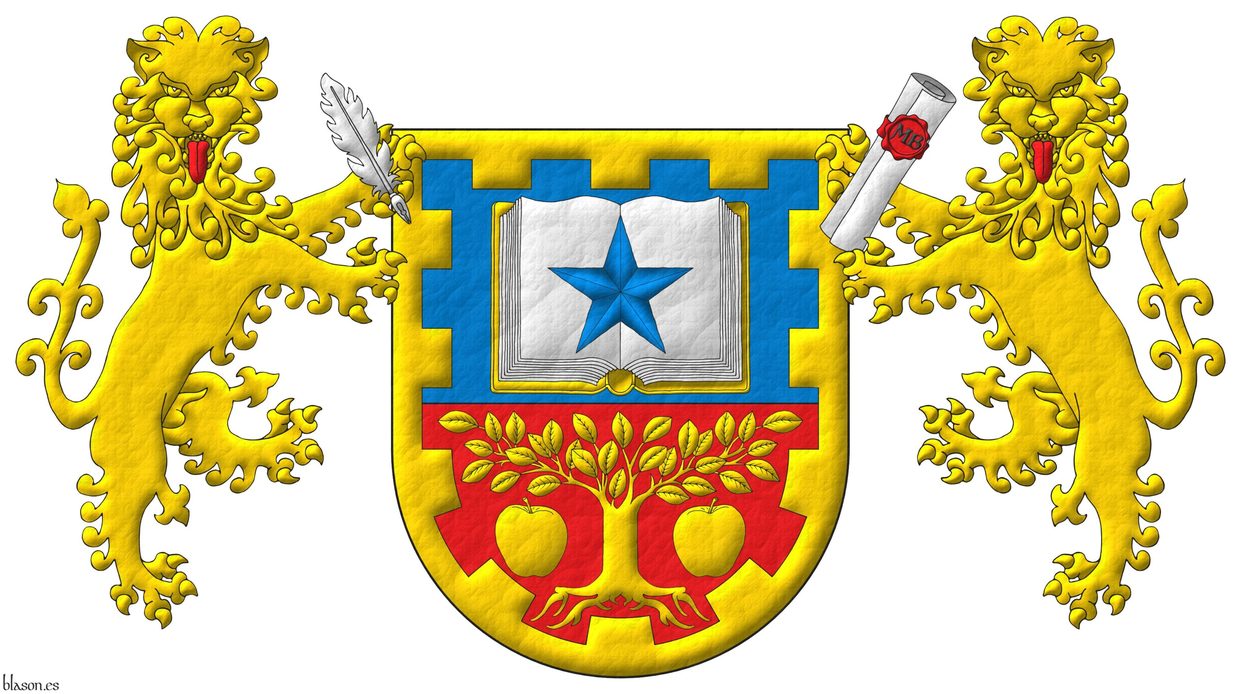Letter

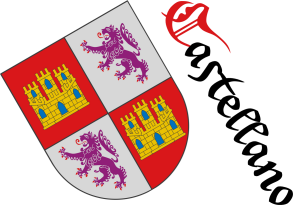
![Ver [Castilian heraldry] en criterios utilizados. Unicornio saltante sobre la divisa, criterio.](../css/Unicornio.Criterio.png)
Castilian heraldry
Key Characteristics in Castilian Heraldry
Some of the main characteristics of the heraldry of Castile are:
- the rounded shapes, with a semicircle at the base,
- the importance of bordures,
- the inclusion of words and also letters in the coat of arms,
- the 2nd most common animal, after the lion, is the wolf [Valero de Bernabé, L.; 2010], and, of course,
- our castle triple-towered Or, port and windows Azure, masoned Sable [Valero de Bernabé, L.; 2009a].
The following image shows 4 examples of coats of arms, each of which has some of these characteristics, including one Castilian castle.
Comparing Castilian and English Heraldry
In the United Kingdom, there are several heraldic traditions, one of them being English heraldry.
In the Kingdom of Spain, there are several heraldic traditions, for example, the Castilian tradition.
In my humble opinion, we should compare at the same level, English heraldry with, for example, Castilian heraldry, but not with all Spanish heraldry. We shouldn't do it for the same reason we don't mix Scottish heraldic tradition with English, as they are so different.
In the case of Castilian heraldry, the 8 main differences with English heraldry are:
- The rounded shapes, with a semicircle at the base.
- The importance of bordures and the existence of the diminished bordure, called in Castilian «filiera».
- The inclusion of words and also letters in the coats of arms.
- The wolf is the 2nd most common animal, after the lion.
- The castle, triple-towered, which is different from the English and French types of castles.
- We can inherit arms from our mother and/or father; for example, the castle in the 1st quarter of the coat of arms of Castile and the coat of arms of Spain comes from a mother, Queen Berenguela of Castile, mother of King Fernando III, the Saint.
- There are 3 kinds of supporters with their owns heraldic names: «tenantes», human forms; «soportes», animals; and «sostenes», plants and things.
- Our quarterings do not necessarily mean that the arms are marshalled by inheritance. [Williams, N.; 2017; page 135, paragraph 26.02] describing the arms of Éamon de Valera, 1882-1975, President of Ireland, writes «Those arms are Spanish in appearance. The quartering without functions as a means of marshalling, is distinctively Iberian».
Categories: Criterion, Semi-circular, Bordure, Letter, Lion, Wolf, Castle, Triple-towered, Port and windows, Masoned, Or, Azure, Sable, Diminished bordure, Quarterly, Supporter (human form), Supporter, Supporter (animal) and Supporter (thing).


![Ver [Chaparro D'Acosta L.; 1979] en referencias bibliográficas. Libro abierto, hojas de plata, filo de oro, guardas de gules, tapas de sable.](../css/Libro.Bibliografia.png)
Chaparro D'Acosta L.; 1979
Lino Chaparro D'Acosta, «Heráldica de los Apellidos Canarios», foreword by Vicente de Cadenas y Vicent, 2 volumes, Volume I from A to L, 285 surnames, 293 pages, Volume II from M to Z and a heraldic dictionary, 387 surnames, 439 pages, edited by Estudios Tecnicos del Blason, ISBN of the complete work 84-300-2000-4, ISBN of Volume I 84-300-1989-8, ISBN of Volume I II 84-300-418010-8, Las Palmas de Gran Canaria, 1979.
Bibliographical reference of century XX.
Classification: Black and white with color plates and Castilian language.
The author is Chaparro D'Acosta, Lino.
Bibliographical reference mentioned in the following article:


Crown of Crepsi
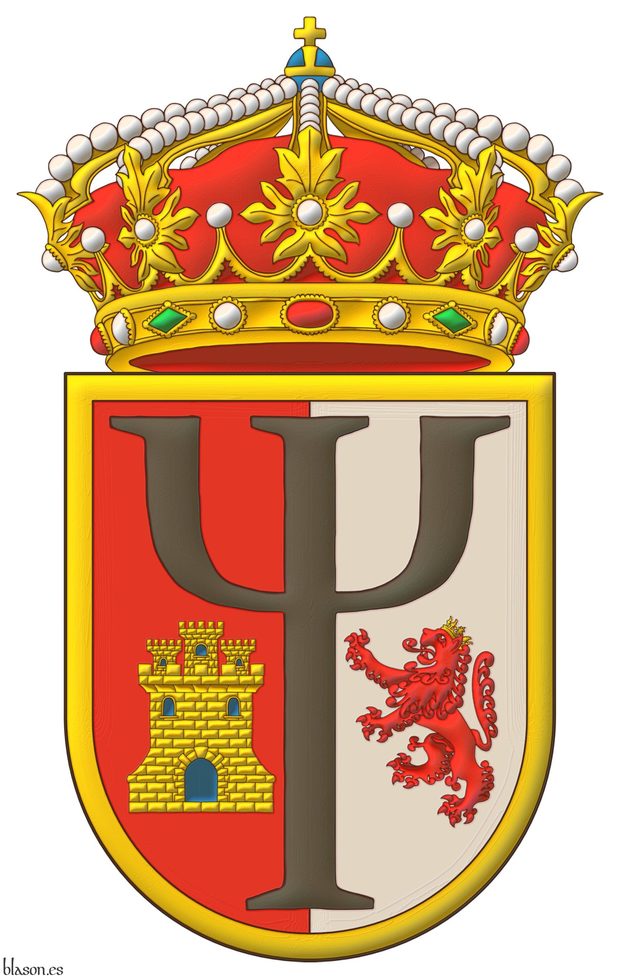
Party per pale: 1 Gules, in base a castle triple-towered Or, port and windows Azure, and masoned Sable; 2 Argent, in base a lion rampant Gules, crowned Or; overall a psi letter sable; a diminished bordure Or. Crest: A closed royal crown.
Coat of arms emblazoned by me, illuminated with lights and shadows, outlined in Sable, with a semi-circular external shape and with a texturized finishing.
Coat of arms of Crepsi, designed by my lieutenant colonel and friend Miguel Angel Nuñez Amador and emblazoned by me.
Blazon keywords: Gules, Argent, Or, Azure, Sable, Party per pale, In base, Castle, Triple-towered, Port and windows, Masoned, Lion, Rampant, Crowned, Overall, Letter, Diminished bordure, Closed royal crown and Crown.
Style keywords: Outlined in sable, Illuminated and Semi-circular.
Classification: Military, Interpreted, Boa and Coat of arms.
Bearer: Crepsi.


Fernando Marán Bié, The Armorial Register
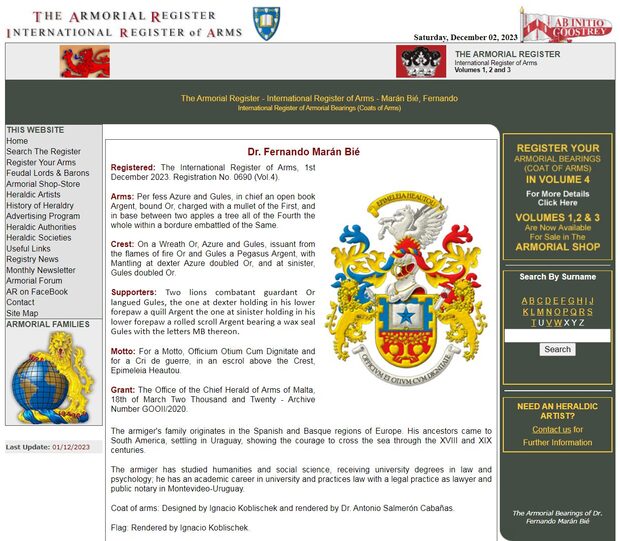
Registered by The International Register of Arms, 1st of December of 2022, Registration number 0690, Volume 4.
In Spanish heraldry, there are three terms for supporters: «sostenes» for objects or plants, «tenantes» for human figures, and «soportes» for animal forms. The following applies to sostenes, tenantes, and soportes. Unlike other heraldic traditions such as English heraldry, in Spanish heraldry there are no rules for the use of supporters; their use is at the armiger's discretion, without specific restrictions. Supporters are not reserved only for nobility; their use is free for all.
In the words of [Cadenas y Vicent, V. de; 1975; page 173] «there is no rule that determines the use of tenantes, soportes, and sostenes».
Categories: Armorial roll, Party per fess, Azure, One, Book, Open, Or, Leaved, Argent, Charged, Mullet, Gules, Tree, Erased, Between, Two, Apple, Diminished bordure, Embattled, Crest and mantling, Helm, Fimbriated, Wreath, Mantling, Dexter, Sinister, Crest, Pegasus, Rampant, Nascent, Flame, Supporter (animal), Supporter, Lion, Langued, Quill, Claw, Parchment (scroll), Rolled, Seal, Letter, War cry and Motto.
External resource:
Root: The Armorial Register.


Guallini, Mario Antonio

Argent, the letters «GVA» conjoined Sable, a trimount in base Vert; on a chief Azure, three mullets of eight points Or, 1 and 2.
Escudo de plata, un monte de tres peñas de sinople, moviente de la punta, surmontado de las letras «GVA» unidas de Sable; en un jefe de azur, tres estrellas de ocho puntas de oro, 1 y 2.
Coat of arms painted by me, illuminated with lights and shadows, contoured in Sable, with an ogee external shape and with a freehand finish.
R0067, Chief Herald of Malta's register of the coat of arms of Mario Antonio Guallini. This coat of arms has been emblazoned by me.
Blazon keywords: Argent, Vert, Sable, Azure, Or, One, Three, Eight, Letter, Conjoined, Trimount, In base, Chief, Mullet and Disordered.
Style keywords: Outlined in sable, Illuminated, Ogee and Freehand.
Classification: Personal, Interpreted, Boa and Coat of arms.
Bearer: Guallini, Mario Antonio.


Hradec Králové Region
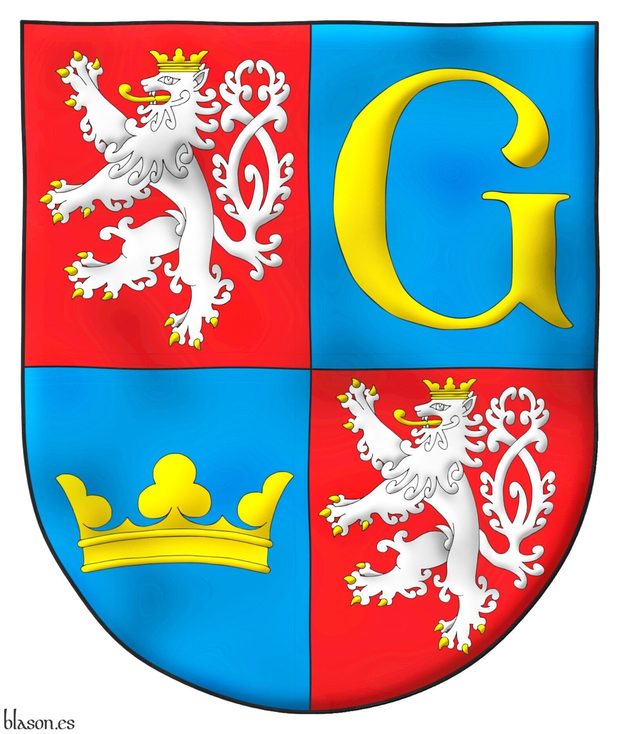
Quarterly: 1 and 4 Gules, a lion rampant, double queued Argent, armed, langued, and crowned Or; 2 Azure, a letter «G» Or; 3 Azure, a coronet trefoiled Or
Escudo cuartelado: 1o y 4o de gules, un león rampante, de cola horquillada de plata, armado, lampasado y coronado de oro; 2o de azur, una letra «G» de oro; 3o de azur, una corona trebolada de oro
This coat of arms is illuminated with lights and shadows and has a finish like glass.
The Hradec Králové Region is an administrative unit of the Czech Republic. It is located in the historical region of Bohemia. Its capital is Hradec Králové, whose Latin name is «Gradicium», hence its old name «Gradec». The letter «G» seen in both the coat of arms of the Hradec Králové Region and the coat of arms of its capital originates from this historical name. The lion rampant Anrgent, double queued and crowned in the 1st and 4th quarters is the symbol of Bohemia, and it also appears in the 1st and 4th quarters of the coat of arms of the Czech Republic. «Králové» means «of the queen» in Czech and there is a trefoiled crown in the 3rd quarter
Blazon keywords: Quarterly, Gules, One, Lion, Rampant, Tail, Double queued, Argent, Armed, Langued, Crowned, Or, Azure, Letter, Coronet trefoiled, Ancient coronet, Crown and Trefoiled.
Style keywords: Glass, Outlined in sable, Illuminated and Semi-circular.
Classification: Civic and Interpreted.
Bearer: Hradec Králové Region.


![Ver [ISCH Armorial, February 2018 Edition] en enlaces recomendados. Áncora de oro y la divisa enlace.](../css/Ancora.Enlace.png)
ISCH Armorial, February 2018 Edition
Publication on the blog Twelve Lineages of Soria about the armorial I produced for the ISCH under the title: The eminent heraldist Mr. Antonio Salmerón Cabañas brings us his latest edition of February 25, 2018 of the Roll of Arms of the International Society of Commoners Heraldry ISCH.
This armorial contains coats of arms painted by different heraldic artists, although all those shown in the illustration heading this article were painted by my own hand.
Categories: Link, Gules, Azure, Vert, Sable, Purpure, Or, Argent, Without divisions, Gyronny, Party per pale, Quarterly, Bend, Saltire, Bordure, Chevron, Cross, Pile, Bendlet, Inescutcheon, Chequey, Hurt, torteau, pellet, pomme and golpe, Cadency, Thistle, Fleur de lis, Horse, Crown, Sun in splendour, Martlet, Wolf, Letter, Unicorn, Griffin, Dragon's head and Engouled.
Root: Twelve Lineages of Soria.


Jesus Christ, with bezants Or
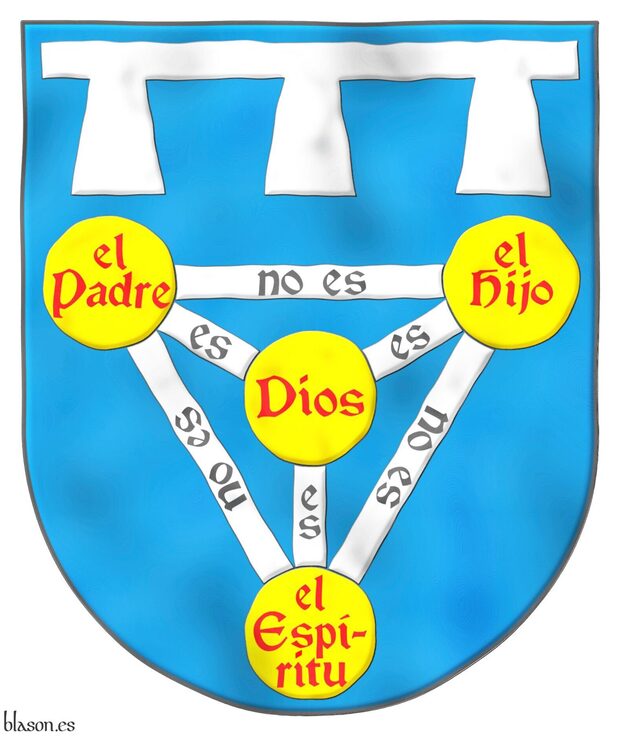
Azure, a pall couped Argent, its three arms charged with «es» Sable, within a triangle reversed Argent, its three arms charged with «no es» Sable, all debruised by four bezants, three on the vertex of the triangle, in dexter chief, charged with «el Padre», in sinister chief, charged with «el Hijo», in base, charged with «el Espítiru», and one on the fess point, charged with «Dios» Gules; in chief a label of three points Argent.
Escudo de azur, una perla recortada de plata, sus tres brazos cargados con «es» de sable, dentro de un triángulo ranversado de plata, sus tres brazos cargados con «no es» de sable, todo resaltado de cuatro bezantes de oro, tres sobre los vértices del triángulo, en la diestra del jefe, cargado de «el Padre», en la siniestra del jefe, cargado con «el Hijo», en la punta, cargado con «el Espítiru» y uno sobre el corazón, cargado con «Dios» todo de gules; en jefe un lambel de tres pendientes de plata.
Imaginary coat of arms that I have interpreted as follows: its base is semicircular (round); its field is illuminated in Azure; the rest is illuminated in Argent and outlined in Sable, except for the bezants which are Or and also outlined in Sable; its letters in plain tinctures, some Gules and others Sable; and the set with a glazed finish.
Pall
The pall (perla) as defined by [Avilés, J.; 1780a; page 239] is «a figure composed of three moving cotises, or that emerge from the two angles of the Chief and the Base, which meet in the center or heart of the Shield in the form of a Greek Y, as if this figure were formed from a half Saltire, and a half Pale».
Blazon keywords: Without divisions, Azure, One, Pall, Couped, Argent, Three, Charged, Letter, Sable, Within, Triangle, Reversed, Four, Bezant, In the dexter chief, In the sinister chief, In base, In the fess point, Gules, Cadency and Label of three points.
Style keywords: Semi-circular, Illuminated, Outlined in sable and Glass.
Classification: Religious, Interpreted, Imaginary and Coat of arms.
Imaginary bearer: Jesus Christ.


José María Lanzagorta Aras, outlined
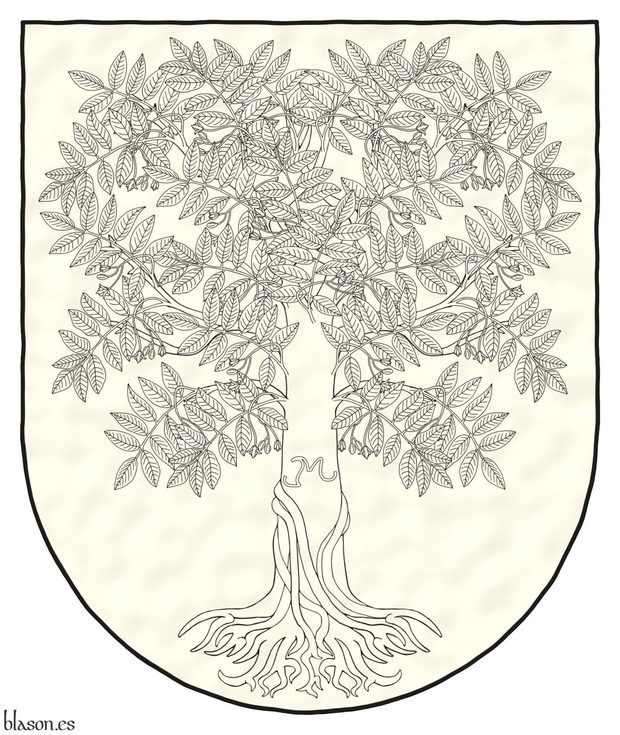
Argent, a Mexican cedar tree eradicated proper, fructed Or, its trunk charged with the letters «JML» Or, branded with a branding iron.
The coat of arms of Jose Maria Lanzagorta Aras designed by grand nephew Juan Lanzagorta Vallín and outlined by me. He was a cattle rancher and built the «hacienda» known as «Cedro Viejo» in Veracruz. The Mexican cedar tree (Cedrela salvadorensis) is different from the cedar of the Pinaceae family.
Blazon keywords: Argent, Or, One, Mexican cedar tree, Eradicated, Proper, Fructed, Trunk, Charged, Branding iron and Letter.
Style keywords: Outlined, Outlined in sable and Semi-circular.
Classification: Personal, Interpreted, Boa and Coat of arms.
Bearer: Lanzagorta Aras, José María.


Larre, lineage of Bayonne, French Basque Country
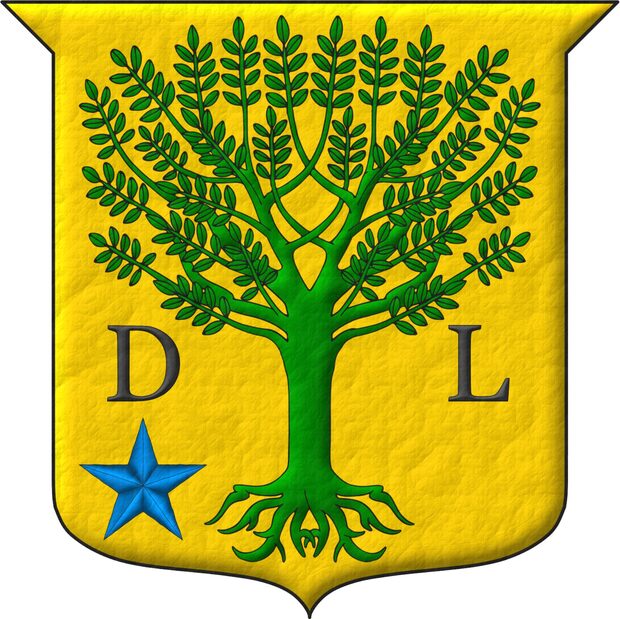
D'or à un arbre arraché de sinople, accosté à dextre de la lettre capitale «D» et à senestre de la lettre capitale «L» du même, et une étoile d'azur posée au canton dextre de la pointe.
Or, a tree eradicated Vert between a capital letter «D» and a capital letter «L» Sable, in the dexter of the base a mullet Azure.
Illuminated with lights and shadows and with a leather finish.
Blazon keywords: Without divisions, Or, One, Tree, Erased, Vert, Between, Letter, Sable, Canton, Dexter, Base (lower 1/3), Mullet, Five and Azure.
Style keywords: Leather, Outlined in sable, Illuminated and Semi-circular.
Classification: Interpreted, Lineage and Kingdom of France.


Lazcano, lineage of the Canary Islands
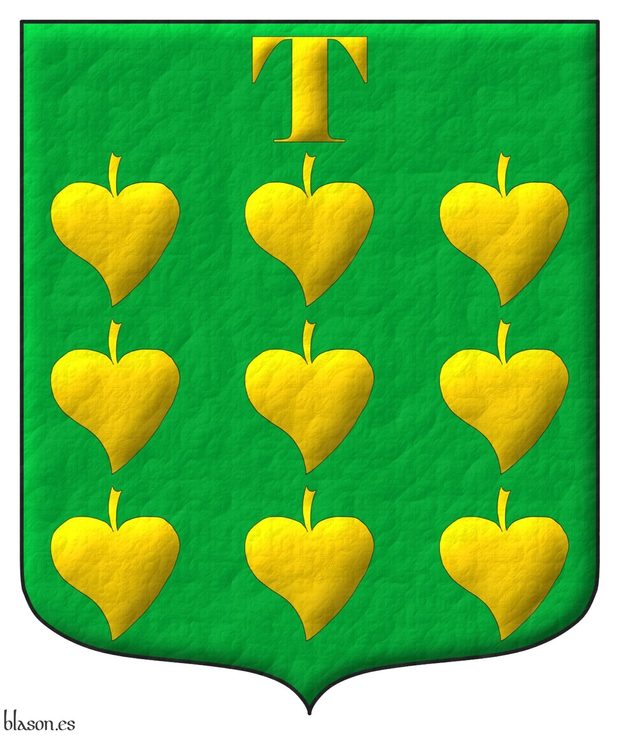
Blazon of the lineage Lazcano in the Canary Islands.
Vert, nine Poplar leaves ordered, in chief a «T» letter Or.
Illuminated and leather finishing.
It can be consulted at [Chaparro D'Acosta L.; 1979; página 251].
Blazon keywords: Without divisions, Vert, Letter, Poplar leaf, Or and Nine.
Style keywords: Leather, Outlined in sable and Illuminated.
Classification: Interpreted.


Supporters of Fernando Marán Bié
Party per fess: 1 Azure, an open book Argent, garnished Or, charged with a mullet Azure; 2 Gules, a tree eradicated between two apples Or; within a bordure embattled Or. Supporters: Two lions rampant guardant Or, langued Gules, the one at dexter grasping in his sinister forepaw a quill Argent, the one at sinister grasping in his dexter forepaw a rolled scroll Argent, bearing a wax seal Gules, inscribed with the letters «MB» Sable.
Coat of arms painted by me, illuminated with lights and shadows, contoured in Sable, with a semi-circular outer contour and with a leather finish.
The coat of arms of Fernando Marán Bié designed by Ignacio Koblischek and emblazoned by me. In Castilian, the lion and the leopard are the same heraldic animal, which is referred to by one name or the other depending on its attitude: a) The lion is shown in profile and rampant, as in the coat of arms of the Kingdom of Spain. b) The leopard is passant and guardant, faces the observer, as in the coat of arms of the Kingdom of England. c) The «león leopardado» is shown in profile like the lion, but is passant like the leopard, as in the arms of the family of Claus Schenk von Stauffenberg. d) The «león leopardado» is guardant like the leopard, but is rampant like the lion; this is the case with the supporters of this coat of arms. The conclusion drawn from the four points above is that the direction of the gaze takes precedence over the posture of the body: when is guardant it is termed a leopard, and when it is shown in profile it is termed a lion.
Blazon keywords: Azure, Gules, Argent, Or, Six, One, Two, Party per fess, Open, Book, Garnished, Charged, Mullet, Tree, Eradicated, Between, Apple, Bordure, Embattled, Supporter, Dexter, Sinister, Lion rampant guardant, Langued, Grasping, Forepaw, Quill, Rolled, Scroll, Inscribed and Letter.
Style keywords: Outlined in sable, Illuminated, Semi-circular and Leather.
Classification: Personal, Interpreted, Boa, Coat of arms and Seal.
Bearer: Fernando Marán Bié.


The coat of arms o-IX on tartan
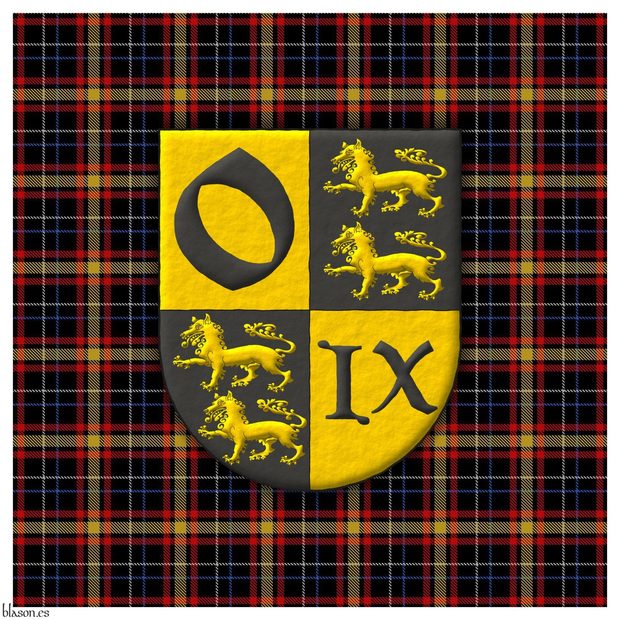
Quarterly: 1 Or, an «o» Sable; 2 and 3 Sable, two wolves passant, in pale Or; 4 Or, an «IX» Sable.
The o-IX coat of arms, designed and emblazoned by me, over its official tartan also designed by me. It is an unusual asymmetric tartan known as «Spanish Night».
Blazon keywords: Quarterly, Or, Sable, One, Letter, Two, Wolf, Passant, In pale and Number.
Style keywords: Pointed, Illuminated, Outlined in the field tincture, Freehand and Chinapieria.
Classification: Tartan, Created and Personal.
Bearer: Salmerón Cabañas, Antonio.
-
Language
-
Categories of heraldry
-
Divisions of the field
- Without divisions
- Party per pale
- Party per fess
- Party per bend
- Party per bend sinister
- Tierce
- Tierce sinister
- Tierced per pale
- Tierced per fess
- Tierced per bend
- Tierced pallwise inverted
- Quarterly
- Quarterly per saltire
- Gyronny
- Party per fess, the chief per pale
- Party per pale, the sinister per fess
- Party per fess, the base per pale
- Party per pale, the dexter per fess
- Chapé
- Chaussé
- Embrassé
- Contre-embrassé
- Party per chevron
- Enté
- Enté en point
- Flanched
-
Metals
-
Colours
-
Furs
-
Other tinctures
-
Ordinaries and sub-ordinaries
-
Diminutives of the ordinaries
-
Geometric charges
-
Composite ordinaries
-
Inanimate charges from Nature
Atom, Crescent, Diamond, Emerald, Estoile, Increscent, Lightning flash, Moon, Mount, Mullet, Mullet of four points, Orbital, Plough of Ursa Major, Rainbow, Ray of the sun, River, Sea, Snowflake, Sun, Sun in splendour, Sun of May, Terrestrial globe, Trimount, Water and Wave.
-
Vegetal charges from Nature
Acorn, Apple, Apple tree, Ash, Bluebonnet, Camellia, Chrysanthemum, Cinquefoil, Cornflower, Dogwood flower, Double rose, Eguzki-lore, Elm, Fleur de lis, Flower, Gourd, Holm oak, Hop cone, Indian paintbrush, Kapok tree, Laurel, Lily, Linden, Lotus flower, Madonna lily, Mexican cedar tree, Oak, Olive tree, Palm tree, Plantain plant, Pomegranate, Poplar leaf, Rose, Shamrock, Sunflower, Thistle, Tree, Tulip, Vine and Wheat.
-
Animal charges from Nature
Badger, Bald eagle, Barbel, Barn owl, Bear, Beaver, Bee, Beetle, Bighorn sheep, Binson, Blackbird, Boar, Brach hound, Bull, Cow, Doe, Dog, Dolphin, Dove, Eagle, Elephant, Falcon, Female figure, Fish, Flame, Fly, Fox, Frog, Goat, Goldfinch, Goose, Heron, Horse, Hummingbird, Jaguar, Lark, Leopard, Lion, Lion passant, Lion rampant guardant, Lioness, Lynx, Male figure, Martlet, Merino ram, Owl, Panther, Parrot, Peacock, Pelican, Pelican in her piety, Pronghorn, Puffin, Quetzal, Raven, Roe deer, Rooster, Savage, Seagull, Serpent, She-wolf, Stag, Starling, Talbot, Turtle, Tyger, Vulture, Warren hound and Wolf.
-
Parts of natural charges
Arm, Beak, Branch, Caboshed, Chest, Claw, Covert, Dorsal fin, Eagle claw, Ear of wheat, Ermine spot, Escallop, Feather, Foot (palmiped), Foreleg, Forepaw, Hand, Head, Heart, Hoof, Leaf, Neck, Ostrich feather, Palm frond, Paw, Roe deers' attires, Shoulder, Sprig, Stags' attires, Stem, Swallow-tail, Tail, Tail addorsed, Tail fin, Talon, Tibia, Tooth, Trunk, Trunk (elephant), Two hands clasped, Two wings in vol, Udder, Wing and Wrist.
-
Artificial charges
Ace of spades, Anchor, Anvil, Arch, Arm vambraced, Armillary sphere, Arrow, Axe, Bell, Bell tower, Beret, Bonfire, Book, Bookmark, Bow, Branding iron, Bridge, Broken, Buckle, Cannon, Cannon dismounted, Cannon port, Canopy roof, Carbuncle, Castle, Celtic Trinity knot, Chain, Chess rooks, Church, Clarion, Clay pot, Closed book, Club, Column, Comb, Compass rose, Conductor's baton, Cord, Covered cup, Crozier, Crucible, Cuffed, Cup, Cyclamor, Dagger, Displayed scroll, Double vajra, Drum, Ecclesiastical cap, Fanon, Federschwert, Fleam, Four crescents joined millsailwise, Galician granary, Garb, Gauntlet, Geometric solid, Grenade, Halberd, Hammer, Harp, Host, Hourglass, Key, Key ward, Knight, Knot, Lantern, Letter, Line, Loincloth, Maunch, Menorah, Millrind, Millstone, Millwheel, Monstrance, Mortar, Mullet of six points pierced, Nail, Non-classic artifact, Norman ship, Number, Oar, Oil lamp, Open book, Page, Pair of pliers, Pair of scales, Parchment, Pestle, Piano, Pilgrim's staff, Plough share, Polish winged hussar, Port, Portcullis, Potent, Quill, Ribbon, Rosette of acanthus leaves, Sabre, Sackbut, Sail, Scroll, Scythe, Sheaf of tobacco, Ship, Skirt, Spear, Spear's head, Stairway, Star of David, Step, Sword, Symbol, Tetrahedron, Torch, Tower, Trident, Trumpet, Turret, Two-handed sword, Wagon-wheel, Water-bouget, Wheel, Winnowing fan and With a turret.
-
Immaterial charges
Angel, Archangel, Basilisk, Dragon, Dragon's head, Garuda, Golden fleece, Griffin, Heart enflamed, Justice, Mermaid, Our Lady of Mercy, Ouroboros, Paschal lamb, Pegasus, Phoenix, Sacred Heart of Jesus, Saint George, Sea-griffin, Sea-lion, Trinity, Triton, Unicorn, Winged hand and Wyvern.
-
External elements
-
Heraldic creations
-
References
-
Formats
-
Keywords on this page
Open, Port and windows, Between, Embattled, Erased, Eradicated, Azure, Boa, Bordure, Cadency, Charged, Castle, Crown, Crowned, Party per fess, Quarterly, Triple-towered, Outlined in sable, Dexter, Two, In base, Rolled, Coat of arms, Mullet, Diminished bordure, Personal, Gules, Illuminated, Interpreted, Langued, Letter, Lion, Book, Lineage, Wolf, Apple, Masoned, Semi-circular, Nine, Or, Leather, Argent, Without divisions, Rampant, Sable, Vert, Supporter, One and Tree.

